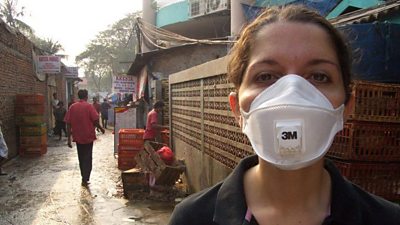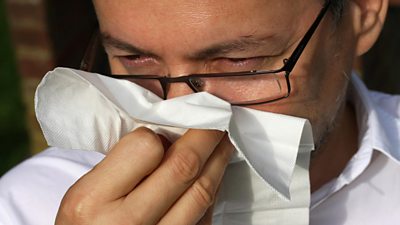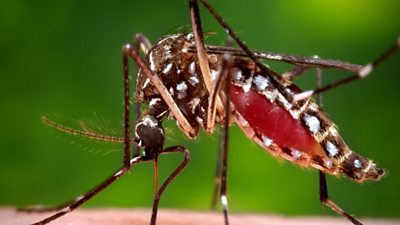This is a virus that is new to humans and was first identified in Saudi Arabia in 2012. There have been about 1000 laboratory confirmed cases which have mainly been located in the Middle East, although as of May 2015 cases have occurred in South Korea.
Approximately one third of cases have been fatal. There is no vaccination for the disease at present.

MERS is a viral respiratory disease caused by a coronavirus. The symptoms normally start with a cough, a fever, then developing shortness of breath and a pneumonia type illness. The original source of the infection is unknown, but we know that Camels can harbour the disease and it could be from this animal source that the spread has happened to humans.
The MERS virus only spreads through close contact between individuals such as caring for or living with an infected person, but the exact mechanisms are still not fully understood. Many infections have occurred in healthcare settings such as hospitals, but researchers have not seen any ongoing spreading of MERS in the community.
Precautions
The risk of contracting the disease by travel to affected areas is very low. All travellers however should take the following everyday precautions to help minimise the spread of germs:-
- Wash your hands often with soap and water. If soap and water are not available, use an .
- Avoid touching your eyes, nose, and mouth. Germs spread this way.
- Avoid close contact with sick people.
If specifically travelling to record or film in healthcare facilities where there are MERS cases you should seek specialist advice before doing so. Normally it is not recommended that 91�ȱ� staff enter clinical areas where they could be closely exposed to those with the infection, however filming in the other public access parts of the healthcare facility is likely to be very low risk.
Camels
The MERS virus has been found in some camels, and some MERS patients have reported contact with camels. However we do not know exactly how people become infected with the virus. The WHO has posted a general precaution for those visiting farms, markets, barns or other places where animals are present and advises individuals to practice general hygiene measures including regular handwashing before and after touching animals, avoiding contact with sick animals or animal products and avoiding consumption of raw or undercooked animal products.
Recommended links
Disease-specific topics
-

Bird Flu
Advice for staff covering the outbreak of avian 'flu in Yorkshire in 2014 -

Living with Coronavirus (Covid-19) – advice for staff
Advice for staff about travel and/or interviewing guests -

Disease and Contact with Viruses and Bacteria
A guide for anyone deployed to areas where there is risk from infectious disease from human, animal, insect or parasite sources, including zoonoses. These controls can also apply to harmful bacteria found in incidents such as sewage spills. -

Ebola Virus Disease (EVD)
Ebola is a contagious and often fatal illness which has had periodic outbreaks in the DRC and Sudan. -

Influenza ('Flu)
A guide to influenza, or 'flu', for individuals seeking general advice or during an epidemic or pandemic situation. -

MERS: Middle East Respiratory Syndrome
This is a virus that is new to humans and was first identified in Saudi Arabia in 2012. -

Mpox (monkeypox)
Requirements to be met for Mpox (2024) outbreak coverage and/or travelling to work in areas where there are high reported cases of Mpox. -

Zika Viral Disease
Zika Viral Disease is a mosquito-borne disease caused by the Zika virus. In 2015, the World Health Organisation declared it a global public health emergency.
More from SSR
-
Your platform to record accidents, risk assessments, assurance monitoring and inspections
-
Safety Equipment Stores
Just one number to call: 020 3614 5155 -
91�ȱ� Safety Guidelines
An A-Z of 91�ȱ�'s Health and Safety Guidelines -
Safety Advice Line: 0370 411 0464 Email: safety@bbc.co.uk
Events guidance - key links:
- Exhibitions
- General Guidance
- Indoor Location Recce Checklist
- Outdoor Location Recce Checklist
- Major Incidents & Emergency Planning
- Marketing and Promotional
- Noise Exposure
- Planning and Management
- Responsibilities
- Responsibilities Form
- Laser Lighting Effects
- Strobe Lighting
- Temporary Stages and Rostra
Health topics - key links:
- (91�ȱ� network only)
- Contributors Fitness to Participate
- Display Screen Equipment (DSE)
- (91�ȱ� network only)
- First Aid and Welfare on Location
- International Travel - Risks & Health
- Manual Handling
- Mental Health: 91�ȱ�page
- (91�ȱ� network only)
- Personal Health and Wellbeing
- Pregnancy
- Psychological Trauma Support & Trauma Risk Management (TRiM)
- Tiredness and Fatigue
- Travel Health Contacts
91�ȱ� High Risk - key links:
- CBRN and Industrial Spills
- Covert Filming
- Crisis Management and Security Support
- Demonstrations, Protests and Crowds
- Disaster Coverage
- Door Stepping
- (91�ȱ� network only)
- (91�ȱ� network only)
- Public Order
- Safety Equipment Stores
91�ȱ� Journalism - key links:
91�ȱ� Productions - key links:
- Aerial Filming and Airfields
- Animals: Displaying and handling for performance
- Boats: Working on
- Children and Young People
- Driving
- Electrical Equipment and Systems
- First Aid and Welfare on Location
- Food Safety (Cooking and Catering)
- Remote Location Working
- Roads and Streets: Working by
- Security of Productions on Location
- Stunts
- Tiredness and Fatigue
- Unmanned Aerial Systems (UAS aka Drones)
- Vehicles: Recording in, from and around
- Working at Height: Mobile Elevating Work Platforms
- Working at Height: Tower Scaffolds
91�ȱ� Radio - key links:
- (91�ȱ� Network only)
91�ȱ� Security - key links:
91�ȱ� Sport - key links:
About this site
This site describes what the 91�ȱ� does in relation to managing its health, safety and security risks and is intended for those who work directly for the 91�ȱ�.
It is not intended to provide instruction or guidance on how third parties should manage their risks. The 91�ȱ� cannot be held liable for how this information is interpreted or used by third parties, nor provide any assurance that adopting it would provide any measure of legal compliance. More information
Some links on this site are only accessible when connected to the 91�ȱ� network
